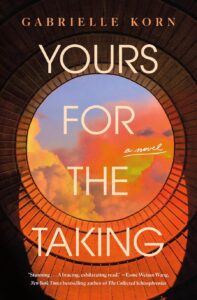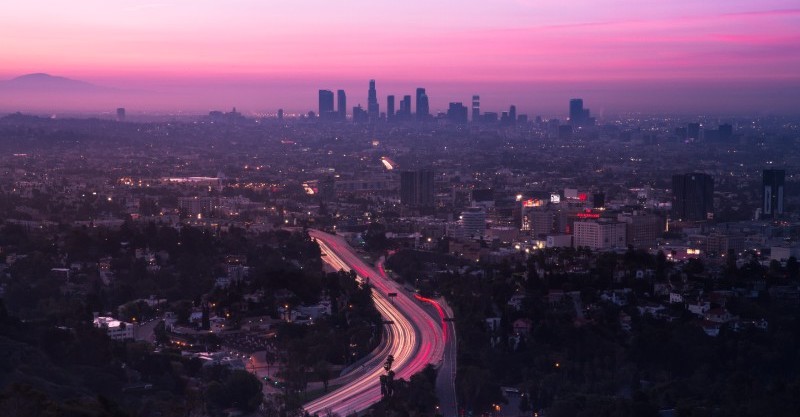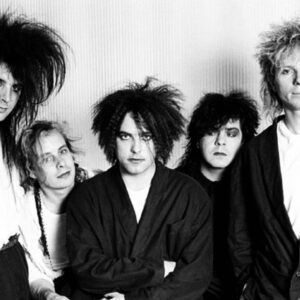Pink Dystopia: Gabrielle Korn on How a Decade in Women’s Media Inspired Her Novel
“What no one said out loud was that it already did mean something—to other people’s bottom line.”
Science fiction made me want to be a writer.
As a child in the ‘90s I read Interstellar Pig because my older sister loved it, and that’s when it started—a lifelong obsession with alternate universes, aliens, time travel, dystopia; a compulsion to read and eventually tell stories to make sense of the world. My mom introduced me to the idea that if you love a book, the next thing to do is read every other book by that author.
So after I read everything by William Sleator, I tackled Madeline L’Engle and Philip Pullman, then Octavia Butler, Isaac Asimov, Margaret Atwood. I’ve never been a science or math person, but even then, science fiction read like poetry. Instead of focusing on the mechanics of the science, I fell in love with the construction of the metaphors.
It wasn’t books alone; watching Jodie Foster’s intergalactic travel in the movie Contact was the closest thing I felt to a spiritual awakening. I fell in love with any film where someone whispers grave news in the president’s ear—the size of the comet headed for earth or the fact that the aliens are already here—his response, on cue, a trembling “Dear God.”
I found myself wanting to write the story of an all-female utopia that becomes a dystopia because categories of gender are flimsy.Later, when I tried to write my own science fiction, I came up short. I could whip up a strong beginning—a mysterious supernatural situation with high stakes and a dash of romance—but felt blocked after that. At the time, I thought that I had nothing bigger to say.
So I gave up.
*
In college, I studied feminist theory and afterward I worked at an abortion clinic. It was 2011. I lived in Queens with my girlfriend, my two sisters, and their boyfriends, and worked in organizing with the New York City Dyke March and volunteered at the Lesbian Herstory Archives. But I desperately wanted to write, and the digital media boom meant there were writing jobs within reach. And, women’s digital media was now feminist, or at least that’s how it was described—by everyone from the public-facing founders to the brands who advertised on their sites.
I found a place in this new, allegedly feminist media world, and my life took a sharp pivot. My title? Beauty editor. My job? Writing about hair, makeup, skin care, nails. I was surprised by how much I liked doing it, as though some ancient undercurrent of aesthetic knowledge had always been running through me, just waiting to be called upon.
I was one of the only lesbians doing this kind of work at the time, but I wasn’t the only odd girl out. There had been a changing of the guards. Many of us had identities previously left out of a magazine culture infamous for catering to only the straight, cis, white, thin, wealthy. In digital media, we were promised something new and different; the ever-increasing demands of clicks and traffic meant brands were no longer focusing on being exclusive, but simply growing their audiences however possible.
It meant the writers and editors could be openly feminist, in a kind of roundabout way. If we could improve the diversity of the content—and keep our jobs because we were helping grow traffic by reaching more people—maybe that could make all of this, the late nights and the low pay and the frequent verbal abuse doled out by the girlbosses we worked for, mean something to readers. What no one said out loud was that it already did mean something—to other people’s bottom line.
*
Almost a decade later, I was still working in women’s digital media, but between annual layoffs, battling with traffic goals, fighting with various stakeholders about diversity, and clawing my way into a liveable salary, the magic had worn off. I had recently signed a book deal for a memoir in essays, and while I felt proud of it, I also felt something was off. The truth was I still imagined myself writing fiction, and the book, much like my beauty and fashion writing, didn’t really feel authentic to my most ardent dreams.
There’d been a handful of novels over the past few years that I’d loved—and also felt a little jealous of—like Station Eleven, Exit West, Severance, The Power. They all applied a contemporary sensibility to genre fiction in a way that was timeless; the characters and situations felt familiar, real, and relevant, with sci-fi elements used to make larger points about our current world. It was exactly what I had imagined myself doing at some point. Only I hadn’t yet.
There was no invisible hand guiding me toward my goals, I realized. The only way to write the novel I’d always wanted was… to write it. I started digging through my old files of stories I’d started and stopped writing. There was this one real estate horror story I’d written in college about a New York City where there’s no more room left on the ground and so people keep building on top of skyscrapers, making them higher and higher. It had no plot and no characters, and a lot of embarrassing sentences. I found something else I’d scribbled down, something about a beauty industry conspiracy where women become so dependent on products that they accidentally start a cult. Again, nothing really there. Then I found a bunch of cringey notes app poetry. Maybe this was a bad idea, I thought.
Also around this time, toward the end of the Trump presidency, I started to notice a new strain of gleeful nihilism online. News about the melting of icebergs or a rogue comet that might swoop near Earth reliably resulted in people publicly wishing for it all to end, for the rising seas or a fiery rock from outer space to just take us all out. I began to wonder what that end might look like for all of us. Who would we become and what would we care about, with different stakes?
I looked back at all my half-starts with a renewed focus. Maybe I had been trying to write one story, jotting down different pieces of it that needed to be pulled together. I started to imagine a weather-ravaged world where people apply to live inside a city-sized structure safe from the elements, forever. The Inside Project, I wrote. Once you enter, you can’t leave. The backdrop? Not just a country ruined by lethal storms, but also by things that were already creating cracks in our society, like gender essentialism. I imagined a future men’s rights movement so successful it pushes feminism back into the binary thinking of the second wave, a logical continuation of the commercialized feminism we were currently living through. Inside, I decided, would be formed as a reaction to these gender wars—it would be a place with no men.
It is anywhere you’ve gone to work for some promised lofty mission and suddenly found yourself complicit in things that compromise your values in order to keep your job.I have always been interested in the way queerness and second wave feminism bump up against each other. I found myself wanting to write the story of an all-female utopia that becomes a dystopia because categories of gender are flimsy; because even if you call something feminist, once you have a hierarchy along a gender binary it’s just recreating power structures.
Not unlike women’s media.
*
It was February 2020 and I was in Paris for Fashion Week. Those of us who worked in the States started getting word that upon our return, we’d need to quarantine for fourteen days. How odd, given I’d just written the first chapter of a story about a world in which living inside is the only guaranteed safety. On one of my last nights there, alone at the hotel bar, I opened my computer and as though possessed, I typed: “The strangest part of living through the beginning of the end of the world was that she began to fantasize about it finally just happening already.”
I could see her clearly: a masculine-of-center lesbian at the end of her rope. She knows too much about climate change; she knows they’re all doomed. So when her girlfriend is accepted to the Inside Project and she isn’t, she abandons everything, fleeing into the wilderness, because fuck it, why not, right? And then she spends the rest of her years regretting it, even as she’s fighting to survive. I had never felt more invigorated as when I wrote that sentence. I couldn’t wait to write more.
Of course, when I got back home, it wasn’t just a two-week quarantine. I never went back to that office. I kept writing this strange story that was taking over my life. It was all I could think about. A welcome distraction from thinking about the pandemic, which was otherwise inescapable.
What I realized as I worked on the first draft of the science fiction novel I’d dreamed of writing for so long was that I was more interested in the central relationships between my queer characters than in the apocalyptic backdrop I’d written for them. But, when I let friends and family read it, they wanted to know more about Inside, this place I’d stuck my characters. They wanted to read more about the woman I’d created to run it, who had her own avaricious agenda under the guise of feminism. So although at first I only pictured this one queer couple, I then had to build their world. A world that was looking more and more like the one I’d been part of for so long; pink, glossy, and built on contradictions.
So many people have asked me what Inside is supposed to represent. Is it Glossier? The Wing? Goop meets Tesla? To which the answer is always: Yes. All of them and more. It is anywhere you’ve gone to work for some promised lofty mission and suddenly found yourself complicit in things that compromise your values in order to keep your job.
It’s also none of those places. It is, crucially, fiction.
__________________________________

Yours for the Taking by Gabrielle Korn is available from St. Martin’s Press, an imprint of Macmillan, Inc.




















